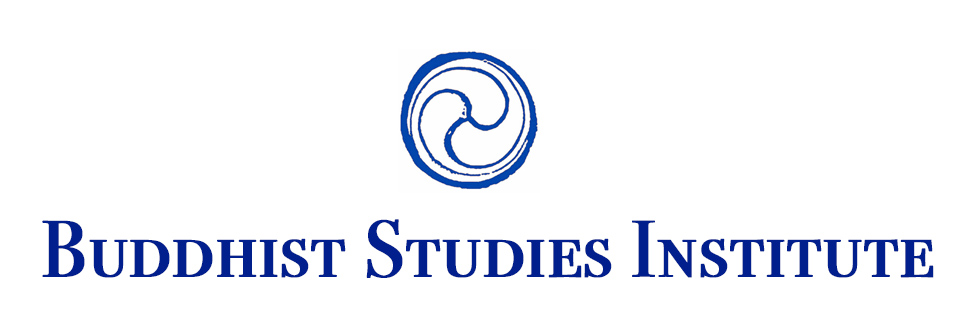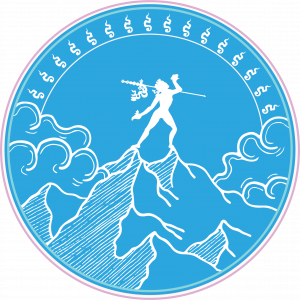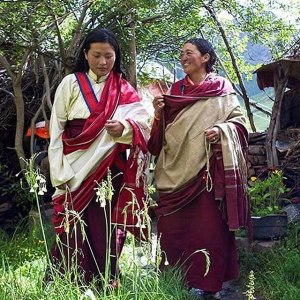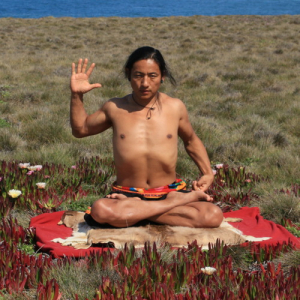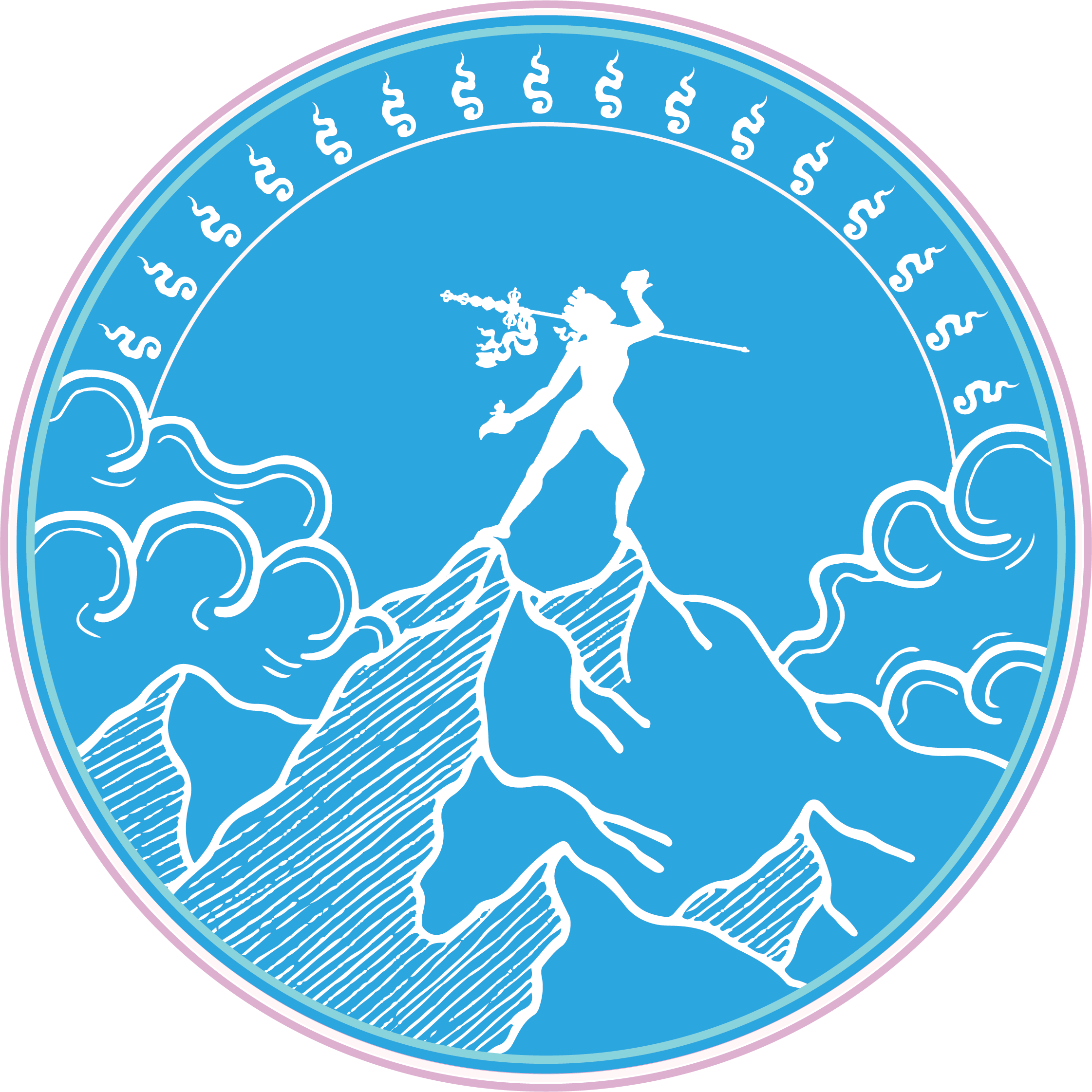Entering the Great Perfection
Three Fold
Practice & Study
of Tibetan Tantra and Dzogchen
Under the Direction of Lama Pema Khandro Rinpoche
For students interested in pursuing the long-term accomplishment of traditional Vajrayana stages of study and practice, the following options are available.
They combine the three types of training in the Nyingma tradition.
- The “shedra” or Buddhist Philosophical College.
- The “drupdra” which is the tantric ritual training, also known as the three year retreat, but offered here at the student’s own pace.
- Third is the “gomdra” the contemplative training with an orientation towards Zhine and Dzogchen meditation practices.
These classes, courses and instructions are offered by Pema Khandro, guest Lamas and where appropriate may also be led by Umzes, the group practice leaders.
Pema Khandro takes a non-sectarian approach. Completion of the stages of practice in any Tibetan Buddhist lineage is considered to be completion of that stage of practice.
For Yogis & Householders
The stages of practice and study are framed here in terms of the Ngakpa tradition of Tibetan Yogis, Yoginis and Yogins. This is the householder path for those who integrate serious spiritual training with work, family and society. Tibetan Yogis may be non-celibate since the tradition values family life and relationships as central to spiritual development.
In Tibetan Buddhism, there are very elaborate, elaborate, non-elaborate and very non-elaborate practices. When one is living in a monastery or a retreat setting where 10 hours of chanting, service and study per day are desirable, very elaborate and elaborate versions of the practices are appropriate. If one lives outside the monastery or retreat setting, then non-elaborate and very non-elaborate practices are appropriate. Pema Khandro teaches the non-elaborate and very non-elaborate version of all the practices from the Dzogchen nyingthig lineage.
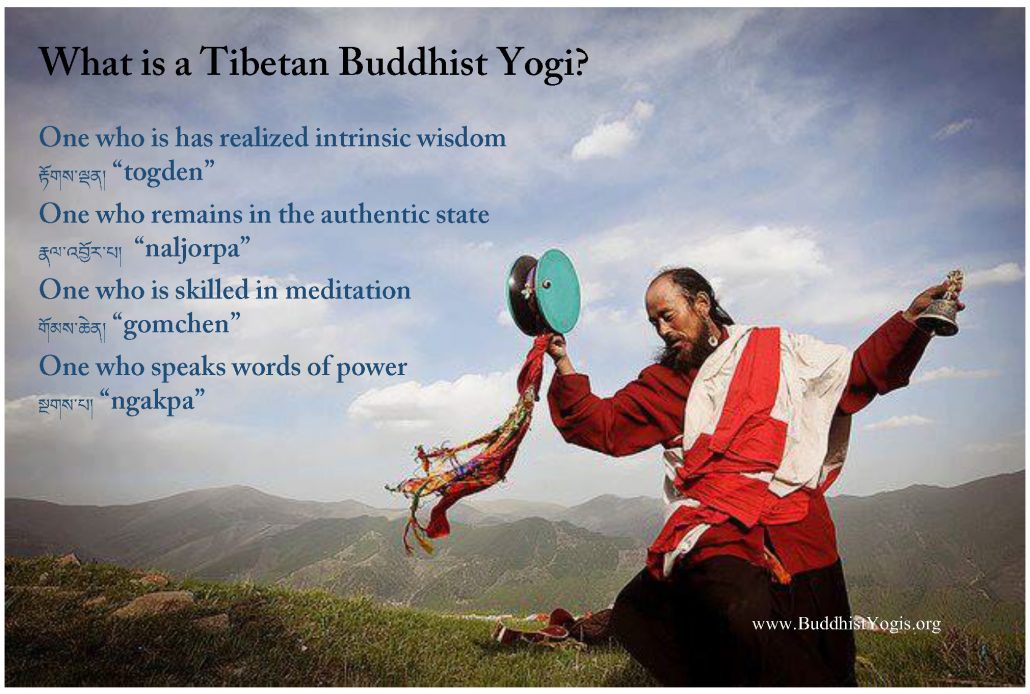
Dzogchen and the Heart of the Vast Expanse
The practices and texts taught in the three series [Simple Path, Tantra and Study] culminate in Dzogchen meditations, although the Dzogchen view and tradition are taught throughout.
The practices and texts all come from Dzogchen Nyingthig, which are pithy methods for realizing the natural mind. They originate from fourteenth century in the collected works of Longchenpa and culminate in the revelations of the great yogi, Jigme Lingpa in the eighteenth century. Therefore it includes two primary cycles, the Heart Essence of the Dakinis (mkha’ ‘gro snying thig) and the Heart Essence of the Vast Expanse (klong chen snying thig).
How to Follow the Path
Students may attend programs à la carte, or for those who wish to engage on a traditional sequence of training stage by stage three options are available.
- Simple path sequence. A yogi’s style of practice focused on simple meditations oriented towards integrating with the natural state. These proceed from Zhine, the calm abiding meditation through Tonglen, the sending and taking practices and then through the initial Dzogchen meditations, the sems ‘dzin, or holding onto the nature of mind meditations.
- Traditional sequence. This sequence adds in a phase of traditional tantric accumulations of 100,000 repetitions of a practice in
- Zhine
- Tonglen the Ngondro series
- Generation stage and completion stage (Yidam)
This is tantric meditation stripped down to its most non-elaborate sequence. - Chod 108 Charnel Grounds
- Tsa Lung
- Dzogchen Meditations
How often should I meditate?
Students may complete meditation practices at their own pace. This may be accomplished as a Daily Practice, Weekly Practice or Bi-Monthly practice on Guru Rinpoche day and Dakini Day, the 10th and 25th day of the lunar calendar.
Simple Path
For those whose schedule, commitments, ability or lifestyle does not allow intensive practice through the entire sequence of tantric meditations, the series of practices is as follows. This is also the case for older students who have less time and need to get to the main point quickly, following Khenchen Tsultrim Lodro’s advice that “after 40” it is permissible to proceed more directly towards Dzogchen.
- Calm Abiding, Zhine
- Chod Meditation on Dakini Day
- Dzogchen Meditations
About the practices
For those who have the time, ability and inclination to pursue the extensive traditional tantric accumulations, the Tantric path is presented in a simplified form for householders. This heart of Tantric practice is ngondro, the Dzogchen preliminaries which are each completed 100,000 times. After completing this series, then there is a yidam practice such as Vajrayogini or Vajrakilaya which are also completed 100,000 times. Following this one engages in Chod meditations until one completes the 108 Charnel Grounds. Finally, it is finished in the Dzogchen meditation series.
Three-Fold Path
Training in Tibetan Buddhism precedes through a variety of practices from calming the mind to visualizations and rituals all the way to practicing with the elements in nature. The practices are engaged with one at a time in a sequence that begins with Calm Abiding Meditation, known as Zhine. This practice remains the heart of all practices throughout the whole sequence.
The stages of the path may be followed sequentially from the beginning or those with a background in Buddhist meditation one may wish to start at a different point in the path. This is noted by the phrase “or its equivalent.”
For those who are not drawn to such a lengthy journey, the primary practices should be: Calm Abiding (Zhine), Chod and Dzogchen. See Simple Path.
1. Foundations
- Zhine
- Five Precepts
- Introduction to Buddhist Meditation
- Tonglen
- Refuge
2. Vajrayana
- Vajrayana Training Classes
- Bodhisattva Precepts
- Ngondro
- Yidam Practice
- Chod 108
- Tsa lung
3. Dzogchen
- Presence as the Path II Cycles
- Tantric Vows
- Semdzin
- 27 Mind Trainings
- 5 Elements
- Separating Samsara and Nirvana (Korde Rushen)
- Break Through (Tekcho)
- Direct Transcendence (Togal)
Overview of Three Fold Path
Simple Path + Tantra + Study
1. Foundations
Description: Foundations include Buddhist ethics, freedom from suffering and the big questions of life from a Buddhist Perspective.
Drupdra: The main meditation done for daily practice at this stage is: Calm Abiding Meditation practice, also known as Zhine Practice. Learn Calm Abiding in our daily meditation classes, free and open to the public.
Buddhist Meditation
Description: Study the practice of meditation in its context, the Buddhist understanding of mind, emotions, body and a compassionate way of life. The Buddhist meditation courses focus on the primary meditation practices of Calm Abiding and Tonglen as we as an orientation to Buddhist ethics in the post-modern context.
Prerequisites: Foundations or equivalent
Drupdra: The main meditation done for daily practice at this stage is Tonglen + Zhine
Vows: The vows that correspond to this level of practice are the Refuge vows.
2. Vajrayana Training I, II & III
Description: A course to support in depth study of Buddhist philosophy according to Tibetan Tantra and Dzogchen. This includes in depth study of classical texts as well as study of ritual, symbols and practices. This study is done in consideration of the historical context and intersection of the tradition and contemporary concerns such as science, psychology and gender equality.
Prerequisite: 20 hours of Foundations and Buddhist Meditation Courses or Equivalent
Vows: Bodhisattva Precepts
Drupdra: The main meditation done for daily practice at this stage is Vajrasattva 100k, then Ngondro
Service: Service is part of training in this level and can range from Padma Committee Service or Volunteering in Other Service.
Privileges: Students who have completed 24 Vajrayana Training classes may apply to be Vajra Sangha members, the long-term personal students of Pema Khandro. Vajra Sangha members are the long term students of Pema Khandro who have a private retreat with her once a year. They are students for whom Pema Khandro is their root teacher. The first year of Vajra Sangha membership is probation and these members may apply for full membership after one year.
3. Dzogchen
Description: Ngakpa Training is offered to support advanced, intensive study of Tibetan Tantra and Dzogchen for serious, dedicated students. This course look at the most precious texts of Longchenpa and Dzogchen Nyingthig in translation into English. It is a deep study, line by line, seriously contending with these texts of the tradition and their contexts.
Pre-requisites: Is for serious and experienced students only such as those who:
- have completed at least 10% ngondro or its equivalent [4-5 fold ngondro of any school of Tibetan Buddhism is accepted]
- want to do the most in-depth training
- completed 24 Vajrayana Training classes in order to be familiar with Pema Khandro’s teaching and Dzogchen Nyingthig lineage in particular
- are Vajra Sangha member and have studied with Pema Khandro for two years
- are continuing to be concurrently enrolled in Vajrayana Training
- regularly attend BSI retreats (may be completed online)
- participate in regular service
- intend to attend for a 3- 5 year period
- are ethical, spiritually mature and take personal responsibility for their lives, their minds and the quality of their relationships
- have stable mental health, since doing serious training can be challenging, it is essential to have evidence of extended period of mental health before doing advanced training in Tibetan Tantra and Dzogchen.
- an approved application
- may need to complete previous classes on a self-paced basis depending on the current module
Robes: Ngakpa Training students who are Vajra Sangha Members wear the red and white shawls
Vows: Tantric vows
Gomdra: The meditations done at this stage are the tantric meditations – Chod 108 Charnel Grounds and Dzogchen
Dzogchen 1
Description: 3-5 Day intensives for in-depth practice and instructions in practice.
Prerequisites: N/A See individual retreat for pre-requisites
Gomdra: The meditations at this stage are Longchenpa’s 27 Mind Training instructions from Excellent Path, as well as the 21 Sem’dzin meditations.
Drupdra: At this stage one should also learn to practice the Smoke Offering and Protectors and other monthly cycles practices.
Dzogchen 2
Pre-requisites:
- Completion of Zhine
- Tonglen
- Ngondro
- Yidam
- Chod 108
- 21 Semdzin practices
Drupdra: The practices engaged at this time are:
Dzogchen 5 Elements Meditations, Korde Rushen practices.
Dzogchen 3
Pre-requisites:
- Completion of Zhine
- Tonglen
- Ngondro
- Yidam
- Chod 108
- 21 Semdzin practices
- 5 Elements
- Korden Rushen
Drupdra: The Dzogchen meditation practices taught at this level are restricted practices,
Breakthrough and Direct Crossing (Tek cho, Thogal).
Ethics for a Safe Supportive Learning Community
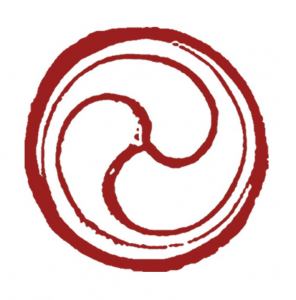
The Five Precepts
- Avoiding harming other beings
- Avoiding taking what has not been given
- Avoiding sexual misconduct
- Avoiding false speech
- Avoiding loss of awareness
For full text please consult: https://www.pemakhandro.org/the-five-precepts/
Consistency of Conduct Policy for All Instructors
- Embodying Buddhist principles:
- generosity, discipline, patience, diligence, compassion, equanimity
- respect for teachers and sangha
- harmony with teachers and sangha.
- Ethical integrity:
- upholding the five precepts and Commitment to Buddhist ethics
- especially maintaining sobriety (in terms of being free from substance addictions)
- and refraining from sexual misconduct (includes refraining from romantic relationships with students and refraining from breaking vows or causing others to break their vows.)
- Refraining from hate speech (including hate speech on social media).
- Ethical commitment to refrain from engaging in sexual relations within an asymmetrical power relationship (ie: teacher/student).
- The Buddhist Studies Institute follows a zero tolerance for abuse policy.
- Continuing psychological and emotional stability and well being throughout the duration of the training.
- A wish to lead, based on service, gratitude, humility, and kindness rather than ego-driven ambition or narcissism. This includes:
- a conscious awareness of one’s own limitations;
- understanding the scope of one’s competence and authority;
- the willingness to draw on support from teachers and other professionals;
- adopting the practice of referring when students have needs outside one’s scope of competency; attribution of credit to sources/teachers when repeating or using their works.
- Personal and interpersonal maturity:
- ability to maintain a harmonious relationship with teachers and peers, emotional maturity to work through difficulties in practice and interpersonal difficulties, maintaining respect for past teachers and dharma community
- Respect for diversity:
- Respect towards other religious views, expressing kindness towards all beings regardless of race, ethnicity, gender, religion, sexual orientation or sectarian affiliation; respect for all types of Buddhism.
- Completion of required self-paced modules on anti-racism, anti-sexism, and trauma informed teaching
- Willingness to engage Buddhism with intellectual freedom including open reception of doubts, questions, challenges and contradicting evidence
Zero Tolerance for Abuse
We have a zero tolerance for abuse. This is for two reasons – for Buddhism to flourish in America, in a context of gender equality, we must have a clear zero-tolerance for abuse to nurture a culture of safety and respect for vulnerable people.
Secondly, for Vajrayana pedagogy to evolve in the face of research into learning and attachment, we must have a clear zero-tolerance for abuse.
Zero Tolerance for Abuse Statement
We have a zero tolerance for abuse. There is no reason to justify abuse. Abuse is cause for dismissal from the classes, membership and Vajra Sangha and revocation of authority to teach.
Abuse is an ambiguous term and can be subject to interpretation. Here abuse is defined by harming others or oneself. Abuse includes treating someone with cruelty or violence.
We recognize that patterns of abuse may come from deep wounding, trauma or mental illness. However, in order to be a part of in-depth trainings one must be stable, reliable and a safe person to be around. Otherwise, we cannot guarantee the safety of retreatants and members who choose to practice in-depth at the events.
If one is not yet at that level of stability and safety, then Vajrayana Training, Ngakpa Training and Vajra Sangha is not appropriate for that person.
Abuse may even come from particular interpretations of teachings. However, any interpretation of the teachings which enables abuse is considered to be a misinterpretation of the core principles of Buddhism which we focus on – which is to relieve suffering and avoid harm. Any interpretation of Buddhism that is not kind is considered to be a mismatch with the work of Pema Khandro and BSI.
All teachers certifications given by BSI will be revoked if a student is found to have abused another/others. Some examples of Abuse include:
- Physical Abuse: Hitting, slapping, shoving, grabbing, pinching, biting, hair pulling, etc are types of physical abuse (by any one of any gender).
- Sexual Abuse: Coercing or attempting to coerce any sexual contact or behavior without consent, including making unwanted advances or repeated advances after being told no. To avoid sexual misconduct, the guideline is that sexual relationships takes place only between equals, between spiritual adults who are clearly and explicitly capable of giving enthusiastic verbal consent. Therefore asymmetrical sexual relationships between teachers and students is not appropriate and is to be avoided. Instructors authorized by Pema Khandro will lose their authorization if they have sexual relationships with students.
- Emotional Abuse: Name-calling, insulting, denigrating, belittling, slandering etc… Undermining an individual’s sense of self-worth and/or self-esteem is abusive.
- Psychological Abuse: Elements of psychological abuse include – but are not limited to – causing fear by intimidation; suggesting or implying threats; threatening physical harm to self, partner, children, or partner’s family or friends; destruction of pets and property; and forcing isolation from family, friends, or school and/or work.
- Sexual Harassment: sexual solicitation, physical advances, or verbal or nonverbal conduct that is sexual in nature, that occurs in connection with the members activities or roles and that either (1) is unwelcome, is offensive, or creates a hostile educational environment, and the person knows or is told this or (2) is sufficiently severe or intense to be abusive to a reasonable person in the context. Sexual harassment can consist of a single intense or severe act or of multiple persistent or pervasive acts.
Internal community responses to accusations of abuse will be set in addition to local authorities. When appropriate, accusations of abuse will be determined by local legal officials or third party services.
If there are minor ethical infractions, then complaints will be handled by the Council of Elders. However, it is a more serious infraction such as sexual abuse or sexual harassment, then local authorities would be engaged by the Council of Elders or Pema Khandro in consultation with the member who is raising the accusation.
A primary source for this code was the apa code of ethics. See: https://www.apa.org/ethics/code/
The Oath Against Harm for Teachers and Instructors
“In the practice of the Dharma, I hold the student-teacher relationship to be a sacred connection which prioritizes the spiritual development, maturation, and well-being of the student.
Similarly, I hold that Dharma organizations exist to provide safe environments which allow those who practice the Dharma to thrive in supportive communities, founded on aspirations of good-will for all, and supported by a strong ethical foundation of non-harming.
I acknowledge that any behavior which would be categorized as abusive—whether emotionally, physically, financially, psychologically or sexually—or which is exploitative, coercive, or an abuse of power, or which attempts to cover-up such behavior, is harmful and unnecessary in the practice of the Dharma. It is unacceptable in all circumstances.
I am aware that harm has been caused by failures to meet these standards in the past, and I declare my commitment to maintaining them for the well-being and benefit of all. May this commitment help the Dharma to flourish, both now and in the future, and may it help to alleviate suffering and create a more compassionate world.”
Read full text here: https://www.pemakhandro.org/oath-against-harm/
Cultivating Spiritual & Emotional Maturity
A Guide to Aspirations and the Goal of Practice, Study and Service
Self Care
-
- I have a routine for a daily cultivation of spiritual and physical wellbeing. I practice acts of self care on a daily basis.
- Rather than spiritually by-pass so that my practical needs are neglected, I maintain consistent financial health to support my livelihood, and sustain my physical and spiritual needs. I am actively involved in sustaining myself and my family, I contribute to my sangha and care for my material needs in ethical ways.
- I take time for solitude, including periods of solitude on a yearly basis.
- I can concentrate and focus my attention on present moment activities.
- I spend time in creative, restorative playful activities on a regular basis.
- When I have mental or physical health problems I rely on appropriate professional help or expert support rather than try to handle everything myself, or rather than try to handle everything through Buddhist practice.
- I know how to protect myself from harm/self-destructive behaviors and avoid putting myself at risk.
- I know how to avert listening to or spreading gossip.
Managing my State
- I take personal responsibility for my actions, for the quality of my relationships and for my life. I focus on my choices and things I can control rather than blaming and demonizing others.
- I am able to name and identify my feelings verbally to myself and others. I recognize that when I can not be honest about my feelings- self destructive, or other harming actions will follow.
- I know how to self-regulate and practice calming my body and mind on a regular basis. I can de-escalate myself when triggered.
- I take a fearless moral inventory and make amends wherever possible.
- I am honest with myself and others.
- I can trust and can be trusted. I respect others and I am respected.
- I can stay caring and connected through uncertainty, conflict and disagreement. I practice self care when I am angry so I may be respectful.
Dharma (study and practice) / Vows
- I live a life of contribution, cooperation and collaboration.
- I live a life of a service, beyond a transactional mindset.
- I avoid harming others, aware that harm is impossible to avoid completely by being alive so I learn to practice empathy skills and act on compassionate intentions to relieve the suffering of others whenever and wherever possible.
- I see learning as a lifestyle. I am on a spiritual journey, setting intentions and taking actions to evolve.
- I make time for learning and training on a weekly basis, with growth as a core value, to evolve in my understanding of spirituality, to learn new ways of thinking and new ways of being, and to undermine destructive conditioning including all forms of ignorance, racism and sexism.
- I recognize that the way I present myself in the world has an impact. I have a public persona that is respectful, including in social media. My public activity is consistent with my vows and values expressed in these principles. I am guided by my Buddhist values and vows and don’t lose them in the context of social trends.
- I am able to seek counsel and/or discussion with peers in relationship with social issues and trends in a respectful, open minded manner.
- I have stable Bodhichitta as a guiding principle of my life and my practice.
Support system
- I have qualified professionals or experts such as teacher/s, mentors or therapists who I may rely on in times of confusion or difficulty, from whom I receive feedback and with whom I work to clear up difficulties with one of these persons who I am comfortable being vulnerable and honest with. I recognize my need and I reach out for help when I need it.
- I take full and complete responsibility for my own actions and decisions.
- I have deep friendships with peers/equals [anywhere within or outside the community] who I tell truths of my life to on a regular and ongoing basis, relationships which are two way streets, rather than relationships where I am always the superior, teacher, advisor or parent.
- I can ask for and receive help when I need it.
- Even if I identify as a Buddhist, I maintain relationships with non-Buddhists and other people outside my spiritual community so that I have an expansive and diverse network of support and for the purpose of fostering intellectual freedom.
Interpersonal Skills
- I set interpersonal boundaries with kindness and I respect the interpersonal boundaries of myself and others.
- I show up for friends in times of emergency providing emotional and psychological support to others.
- My peers feel respected by me and see me as a healthy trustworthy person.
- I make and keep commitments and renegotiate directly when necessary.
- I am comfortable and relaxed about being told no, and respect that other factors may be more important than my wishes.
- I focus on caring for others, looking out for others and being there for others on a regular basis. This is natural leadership.
- I follow other leaders well, I take directions harmoniously, I ask questions where clarification is needed and solve problems on my own and in teams to support the group directive.
- I care for the whole situation. I care for all people involved by communicating with others before a potentially harmful action or sensitive course of action is taken (instead of taking the action and causing harm to others). I respect the agency and dignity of others to tell them the whole truth and work through hard feelings and solutions together upfront to include the possible requests and concerns of others, and to fulfill those requests with care and diligence. (This especially relates to romantic relationships developing within the organization as a way of protecting safety and connection among members.)
- In relationships, I am able to initiate or engage in healthy, compassionate conversations for clearing breakdowns in a timely manner with care and curiosity. I take myself to task to have interpersonal communications be complete instead of letting them fester and create obstacles.
- I maintain a balanced habit of generosity according to my capacity. I do not have an air of entitlement where I expect others to care for me. Of course everyone needs to be carried from time to time, but I am generally accountable for my needs.)
Compassionate Community and Collective Liberation
- Rather than try to do it all alone, I participate in and nurture compassionate community of mutual care.
- I create a culture of belonging through expressing warmth and positive regard for community members whenever sincere and appropriate.
- I recognize that transformation and change can happen in networks of care and seek to hold a space where the dignity of all participants is nurtured and sustained.
- When in a leadership role, I seek to make decisions which care for the benefit of all rather than the few.
- I act on my values and I am accountable for my actions and relationships in community. Should I fall into a major breach of ethics, I work with the Council of Ethics to formulate an appropriate response, reparation, repair and redemption.
- With a trauma informed perspective, I show unconditional positive regard for other community members, understanding that their behavior is the best behavior possible for them and based on things that happened to them. I avoid putting myself in harms way through healthy boundaries or complaints where necessary, while accepting that other community members may be a different levels of maturity than myself. I avoid putting others in harms way, so if I see abuse taking place, I immediately notify the group leaders, instructors, Council of Ethics and/or appropriate legal authorities.
- I exert to create a safe, caring space for all members, thus I avoid shaming, harming, projecting and traumatizing other community members so I address complaints directly and privately with group leaders, instructors or Council of Ethics rather than raise complaints about other members in front of the group which may be traumatizing to that individual. I seek to resolve questions and conflicts directly wherever possible.
Leadership Trainings
Meditation Instructor Training
Yoga Teacher Training
Host Service
Gekhor Service
Certificate in Buddhist Studies
Umdze Training
Ordination
Certificate in Buddhist Studies
A Certificate in Buddhist Studies is awarded upon completion of five years of Ngakpa Training for students who have also successfully completed:
-
- All pre-requisites for Ngakpa Training including Foundations, Buddhist Meditation and Vajrayana Training
- Meditation Instructor Training
- Empathy Training
- Ngondro
- Yidam practice 100,000 accumulations
- All Exams including yearly losar exams and class quizzes
- 12 Retreats [in person] with Pema Khandro [if retreats are three days, resulting in a total of at least 36 retreat days at minimum]
- 3 Solitary Retreats [following the four session retreat format]
- Attended 50 live ngakpa training classes
- completed 250 hours of service per year or its equivalent
About the Umze Training
A few of the most dedicated long term students may serve as Umze, or group practice leaders. An Umze, is a Tibetan title used in monasteries and ngakpa communities for the person responsible for guiding group practices. We have adopted this term within Ngakpa International for our practice group leaders. Umzes are authorized to lead specific practices, listed below, after completing their training and being certified. Umzes may also be asked to lead these and other practices during teaching retreats led by a lama or authorized instructor. Umzes may need to give instruction at times to people new to the practices, however umzes are not instructors and do not lead retreats, seminars, or workshops in which they teach practices. Umzes may authorized to lead practice retreats in their specialty, in which participants are already familiar with the practices and are simply practicing together for several sessions or days. Umzes also support their groups through organizing appropriate social activities that encourage and support the group.
Election: Historically, umzes have been appointed directly by a Rinpoche based on their knowledge of the sangha and its members needs and knowledge. As BSI grows, we are formalizing our training programs to ensure that all umzes have certain core skills and knowledge. Beginning Losar 2021, Umzes will need to be in umze training or graduate from umdze training. To be nominated one should have a consistent daily practice and have actively participated in a local sangha’s practices, or been a Host, for at least three years. Persons seeking to be an umze may submit a request to Ngakpa International stating their qualifications, training and practices, along with a letter of recommendation from a leader, lama, or instructor within Ngakpa International. Existing Umzes are must complete the training program to remain as umzes.
Pre-requisites:
- Vajra Sangha Membership
- By invitation only after completing 1250 hours of Service (equivalent of 5 years of service)
- Have led 104 Meditation Classes for BSI (2 years of once a week classes)
- Have served as a Host for 1 year
- Have served as Gekor for 1 year
- Have received transmission and training for all the practice cycle in Presence as the Path 2
- Have completed the Skillful Means Trainings
Vows: Tantric Root and Branch Vows Training
About Ordination
Description:
For a very few students, Ordination will be a natural next step in their training. To be ordained in the Ngakpa and Naljorpa Order is to live a life of service to Buddhism and in particular to serve the Lama and sangha full time as a vocation and livelihood. It is a lifelong commitment, providing a unique opportunity within spiritual life. The sangha is dependent on the ordained who maintain the Sangha and Gompas for current practitioners and for generations to come. The process leading to full ordination is long and demanding. Requirements include at least five-ten years of practice as a formal ngakpa training student, with a minimum of three years of Umdze service. This graded approach allows students to find out through experience whether ordained life is right for them, revealing the difference between the reality of committing one’s life to the buddhadharma and any romantic notions about Buddhist training and monastic life.
Ordained sangha will have a title of ngakpa/mo or naljorpa/ma and may be authorized to teach a practice that they specialize in. It takes some time to learn what ordination means for Westerners since ordination in Buddhism is different than in the Christian tradition though there are some parallels. Ordination does not make one a teacher or a Lama, or other type of spiritual leader, those authorizations are conferred separately. To be ordained is to live a life of service to the buddhadharma, lama and sangha and therefore it is a sign of intensive personal training.
Pre-requisites:
By invitation only for Umdzes who have completed
- 3000 hours of service (2000 hours of sangha services and 1000 hours of Umdze service)
- Completed Foundations, Buddhist Meditation
- Completed 5 years of Ngakpa training and Vajrayana Training with near perfect attendance, completed all homework and passed all exams
- Fulfill spiritual maturity requirements
- Completed GL trainings
- BSI Chaplaincy training
Practice: In addition to one’s meditation practice, the practice also is to support Sangha in their practice and study.
